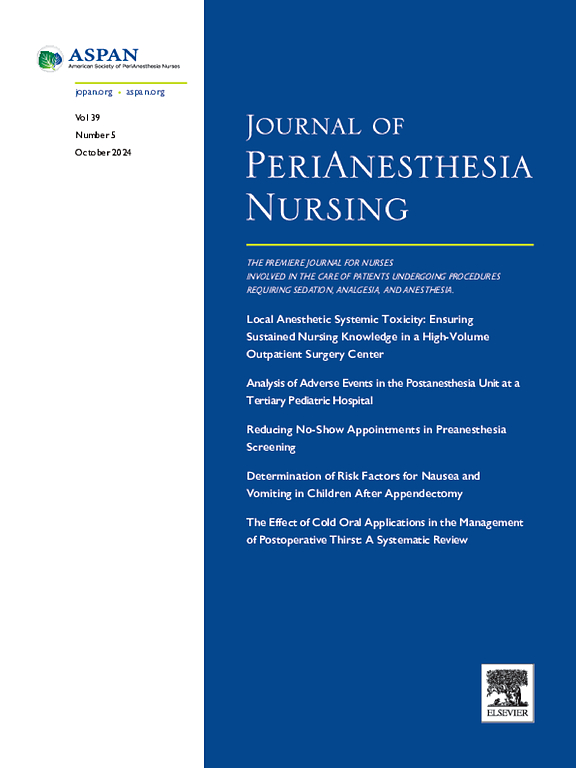Reducing No-Show Appointments in Preanesthesia Screening
IF 1.6
4区 医学
Q2 NURSING
引用次数: 0
Abstract
Purpose
Preanesthesia screening is critical to evaluate the patient’s medical and surgical history before any procedure or surgery to assess for risks and to optimize outcomes during the perioperative period. The purpose of this quality improvement project was to decrease the number of missed appointments in the outpatient preanesthesia and surgical screening clinic and the impact on provider satisfaction.
Design
The design of this quality improvement project was pre and post design. Automated and live phone calls reminders were provided for patients scheduled in the outpatient preanesthesia. Data were collected to compare missed appointment rates from a 3-month period before the project implementation and a 3-month period afterward.
Methods
Predata collection included the number of no-shows in the electronic health record system from the previous 3 months. Participants included all adult patients who are scheduled for a preanesthesia surgical screening appointment. Provider satisfaction was assessed using a 5-question survey, pre and postinnovation.
Findings
Reminder systems had a statistically significant impact on reducing the number of no-shows in the preanesthesia and surgical screening clinic. No significant impact was shown in provider satisfaction.
Conclusions
Implementation of a reminder system can help to reduce no-show rates in clinics. Patient no-shows overload the health system by reducing the productivity of providers and waste resources including use of clinic staff, longer wait times for other patients, and the timing providers put into chart preparation.
减少麻醉前筛查中的爽约现象
麻醉前筛查对于在任何手术或外科手术前评估患者的病史和手术史至关重要,以评估风险并优化围手术期的治疗效果。本质量改进项目旨在减少麻醉前和手术筛查门诊的失约次数,并降低对医疗服务提供者满意度的影响。该质量改进项目采用前后设计。为麻醉前门诊病人提供了自动和现场电话提醒。收集的数据用于比较项目实施前 3 个月和实施后 3 个月的失约率。数据收集包括电子健康记录系统中前 3 个月的未赴约人数。参与者包括所有预约麻醉前手术筛查的成年患者。在创新前和创新后,通过 5 个问题的调查对提供者的满意度进行了评估。从统计学角度看,提醒系统对减少麻醉前和手术筛查门诊中的缺席人数有显著影响。但对医疗服务提供者的满意度没有明显影响。实施提醒系统有助于降低门诊的缺席率。病人爽约会降低医疗服务提供者的工作效率,浪费资源,包括使用诊所工作人员、延长其他病人的等候时间以及浪费医疗服务提供者准备病历的时间,从而使医疗系统不堪重负。
本文章由计算机程序翻译,如有差异,请以英文原文为准。
求助全文
约1分钟内获得全文
求助全文
来源期刊

Journal of Perianesthesia Nursing
NURSING-
CiteScore
2.20
自引率
17.60%
发文量
279
审稿时长
90 days
期刊介绍:
The Journal of PeriAnesthesia Nursing provides original, peer-reviewed research for a primary audience that includes nurses in perianesthesia settings, including ambulatory surgery, preadmission testing, postanesthesia care (Phases I and II), extended observation, and pain management. The Journal provides a forum for sharing professional knowledge and experience relating to management, ethics, legislation, research, and other aspects of perianesthesia nursing.
 求助内容:
求助内容: 应助结果提醒方式:
应助结果提醒方式:


